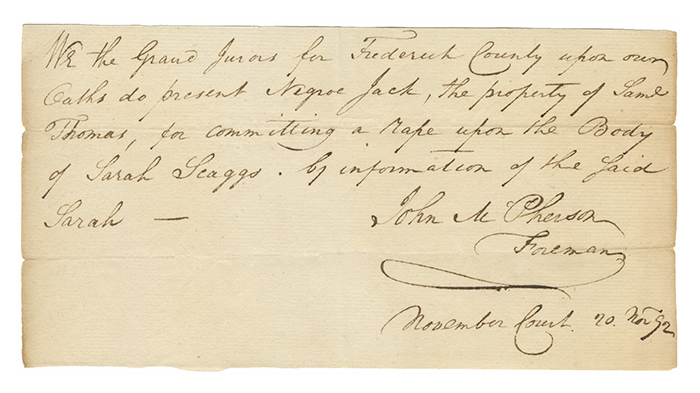
MANUSCRIPT GRAND JURY STATEMENT AND MANUSCRIPT JURY VERDICT FINDING "NEGROE JACK" GUILTY OF "VIOLENTLY AND FELONIOUSLY" COMMITTING THE RAPE OF "SARAH SCAGGS SPINSTER," 1792
(SLAVERY). Manuscript legal documents. Frederick County, Maryland, November 20, 1792 and March 20, 1792. Two unlined sheets, measuring 7-1/2 by 4 inches and 7-1/2 by 6 inches. $1750.
Scarce late 18th-century manuscript documents written on behalf of a Frederick County, Maryland grand jury and jury accusing a slave, "Negro Jack," of committing the rape of "One Sarah Scaggs Spinster" based upon the testimony of the alleged victim and finding Jack guilty of that crime.
The manuscript grand jury accusation reads: "We the Grand Jurors for Frederick County upon our Oaths do present Negroe Jack, the property of Saml Thomas, for committing a rape upon the Body of Sarah Scaggs, by information of the said Sarah. John M Pherson Foreman. November Court. 20 Nov 92." The manuscript verdict reads: "Frederick County Court. The Jurors for the State of Maryland for the Body of Said County upon their Oath present that Negro Jack (the property of Saml Thomas) of the County aforesaid, not having the Fear of God Before his Eyes, but being moved & seduced by the Instigation of the Devil on the twentieth Day of March—in the year of our Lord seventeen hundred and ninety two with force of arms at the county aforesaid in and and up on One Sarah Scaggs Spinster then there in the Peace of the State being ^ violently and feloniously an assault and make another the said Sarah then and there feloniously and ravish and carnally know, against the Law of the Statute in Such Case made & provided and against the Peace Government & Dignity of the State of —- and any land and so forth. Simon Martin for the State." The actual details of this case are lost to history. However, in many cases such as these, the stories were far from transparent. While slaves did occasionally rape white women, the consequences were such that the Jack's alleged actions would have been rare. Rather, relations between white women and slaves were not unheard of in the South, despite obvious issues of consent. "[A]n upper-class woman under suspicion of an affair with a slave could 'readily invoke images of chastity in order to allay trouble for herself'—or in other words, accuse the slave of rape (Hodes, p. 135). Because black men (like black women) were seen as inherently lustful and prone to sexual vice, for an elite woman to have illicit sex with a black rather than a white man might have been a slightly safer bet; it was easier to blame a black man of rape than a white man" (Allain). Women were indeed found out: they gave birth to mixed race children, were forced to secure abortions, and were otherwise discovered. Jack may have been a rapist—such crimes certainly did occur—but he just as likely may have been caught up in an affair he never really had the power to consent to and, when it soured, found himself forced to bear society's punishment when Sarah Scaggs refused to bear it. For Jack, a Black man in the South over two centuries before To Kill a Mockingbird, guilt and innocence were abstract concepts. He would have no chance to testify, no lawyer to represent him individually, and, in any event, no favorable outcome. Original ink docketing notations to verso of verdict.
Mild toning to original creases, light wear to edges. Near-fine condition.